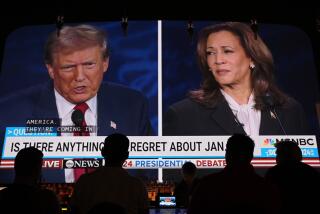Ruling weakens law’s limits on corporate political ads
- Share via
WASHINGTON — Cutting the first hole in a key campaign funding law, a federal court here ruled Thursday that corporations, unions and special interest groups had a free-speech right to run some broadcast ads during the campaign season that refer to candidates seeking election.
In a 2-1 ruling, the judges said “genuine issue ads” that refer to a lawmaker’s pending business in the capital may be the subject of corporate-funded ads.
The decision sets the stage for the Supreme Court to reconsider the McCain-Feingold Act of 2002, the measure that sharply limits the use of money from wealthy donors, corporations and unions in election campaigns.
One provision of the law said money from these individuals and groups may not be used to sponsor radio and TV ads that mention a candidate for federal office in the 60 days prior to the November election. The idea was to stop attack ads from well-funded interests on the eve of an election.
Three years ago, the high court upheld the McCain-Feingold Act in principle, but on a 5-4 vote. The Republican National Committee, among others, had challenged the measure as unconstitutional, asserting that it violated the freedom of speech guaranteed by the 1st Amendment.
Since then, Justice Sandra Day O’Connor, who was in the majority, has retired, and President Bush replaced her with Justice Samuel A. Alito Jr.
Earlier this year, in a little-noticed decision, the high court opened the door somewhat to new challenges to McCain-Feingold. It came in the case of Wisconsin Right to Life Inc., an anti-abortion group that was fighting with the Federal Election Commission over a few radio ads it had run in the summer of 2004. The ads said a group of senators in Washington were “using the filibuster delay tactic” to block a vote on several of Bush’s judicial nominees. “Contact [Wisconsin] Sens. [Russell D.] Feingold and [Herb] Kohl and tell them to oppose the filibuster,” the ad advised.
Since Feingold, the co-sponsor of the campaign-funding law, was running for reelection, the FEC said the anti-abortion group could not run this ad mentioning him in the 60 days prior to the election.
At first, a three-judge panel rejected the anti-abortion group’s challenge, citing the Supreme Court ruling that had endorsed the law. But last year, the high court told the judges to reconsider the matter because this involved an “as applied” dispute, not a general attack on the law in principle.
In Thursday’s ruling, the judges reversed course and ruled for Wisconsin Right to Life. Judges Richard J. Leon and David B. Sentelle described the radio spots as “a textbook example of genuine issue ads.” They do not tell voters to support or defeat Feingold at the polls, the judges said.
In dissent, U.S. District Judge Richard W. Roberts said there was reason to believe the ads “were intended to influence a Senate election” and therefore should be covered by the law.
If the ruling stands, it could open the door for interest-group ads to return to the airwaves during the key months of the 2008 election season.
Professor Richard Hasen, an election-law expert at Loyola Law School in Los Angeles, said the high court is almost certain to take the case if the FEC appeals.
“Given the importance and the controversy around this issue, I would be shocked if the court did not,” Hasen said. The outcome is likely to be “a chipping away at campaign finance laws,” he said.
More to Read
Get the L.A. Times Politics newsletter
Deeply reported insights into legislation, politics and policy from Sacramento, Washington and beyond. In your inbox twice per week.
You may occasionally receive promotional content from the Los Angeles Times.











